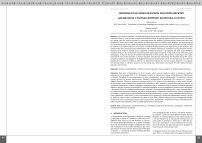Discipline in the classes on physical education and sport
Автор: Ina Vladova, Nikolai Hristov
Журнал: Sport Mediji i Biznis @journal-smb
Статья в выпуске: 1 vol.3, 2017 года.
Бесплатный доступ
The aim of this research is to study the attitude of high-school students from Bulgarian secondary education institutions (VIII, IX, X and XI class) in regard the discipline during the physical education and sport classes. We expect the results from this study to provide us information about the students’ discipline during classes from their own perspective. Object of the study is the opinion of 205 students from 5 schools in Sofia, Bulgaria. The average age of the respondents was 16 years while the distribution by gender was almost equal. For the achievement of the aim and for collection of empirical data on the issue were elaborated questionnaires and inqiry forms for the students. The collected data was processed using mathematical and statistical methods for quantitative processing and analysis: frequency and variation analysis as per approved statistical procedure – by applying the SPSS 21 for Windows statistical program. The achievement of good discipline during classes depends on the professional skills of the sport pedagogues, it depends also on the students and indirectly on their parents. The students, responding to the inquiry assessed the role of their teachers in physical education and sport for maintaining the discipline during the classes using the evaluation scale applied in the Bulgarian educational system (from 2 to 6). The average score at n=187 was calculated to Excellent 5.63 (Min=3, Max=6). An important condition for ensuring a good discipline is to organise the learning lesson in a diverse, dynamic and interesting way, which proves once again the inter-relation between education and training.
Discipline, Students/pupils, Teachers in physical education, Class management, Student’s/pupils behaviour
Короткий адрес: https://sciup.org/170203675
IDR: 170203675 | УДК: 371.54(497.2)”2015/2016”; 371.3::796(497.2)”2015/2016”
Текст научной статьи Discipline in the classes on physical education and sport
In the Dictionary of Foreign Words in Bulgarian Language [1] discipline is defined as: „Mandatory observance of established order, rules, etc. by the members of a group“. Ivan Ivanov determines discipline as „a system of prophylactic and interventional strategies, designated for control and management of the student’s behaviour“[2]. Ivanov cites Wayson & Lasley, that the ultimate goal of discipline at school is: „... to teach the students to behave well without any direct supervision“.
From pedagogical point of view it is extremely important to maintain a good level of discipline during the lessons. Discipline is a priority objective of the school, because it is the pre-requisite for an educational-training process of good quality. According to L. Desev [3], in order this process to be successful, it is the personality and the activities of the teacher that plays the major role, alongside his leadership and communication style.
In Bulgarian schools the subject Physical Education and Sport (PES) is an integral part of the general education-
Ina Vladova, Nikolai Hristov al training. However, the teachers in PES work in „dis-tinctive educational environment“ and under specific characteristics of the pedagogical activity during the classes, because the conditions and organisation of the implementation of the lessons are different [4]. During the lessons in this subject, the teacher through different physical exercises, sports and games achieves didactic, educational and health-prophylactic tasks under the terms of intense locomotor activity. One of the educational tasks is to cultivate right attitude in students towards observance of the rules of good behavior. In their turn these rules are a prerequisite and a factor for safe activities under an active and intense locomotor activity environment.
Any motor activity bears a risk of injury, trauma or contusion, especially during the classes in physical education and sport, where the risk is greater because during a game students may get hurt when colliding with onean-other or being hurt by an object due to inattention, loss of concentration, disturbed balance, blow with an instrument, ball, collision in a wall, etc. This risk increases whenever the discipline is not at the required level, the good behaviour rules are not observed, and also when the teachers’ instructions are ignored. Poor discipline causes also a great increas of the noise level, which is a major stress factor for the participants in the training process.
The role of the teacher and the parents is crucial for the cultivation in the adolescents of habits for observing the discipline. It is important that their efforts stay focused on this issue since early childhood age with the objective of arousal of an aspiration for disciplined behavior. This shall help for development of self-consciousness and self-discipline, sence of independence and of responsibility, that are necessary for the school life but also for the successful realisation of the students at a later stage.
Through requirements for observance of the discipline the good relations between all representatives of the school community are achieved, which ensures a positive and safe training environment.
Upon solving educational tasks, the teachers are those who face most difficulties. These difficulties are resulting from the nature of the activity and from the differences of the trained individuals - related to personality features and pertinent to the specifics of family and friends environment. At a family level the differences are due to the different systems of values of the parents and their atotude towards the activities in school and in particular towards the PES classes. It is for that consideration that when discussing discipline, it is essential to demand a shared responsibility from the parents as well, to seek their support and insistence towards their kids to observe the rules of good behavior, because it is a joint responsibil-ity– of teachers, parents and students (fig. 1).
Discipline in / Sport and business, 3
Figure 1: Theoretical model of the study
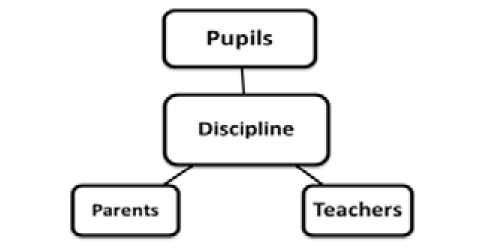
Sourse: Result of research of authors
When discussing discipline and its imposing by the teachers, in modern pedagogical literature we actually envisage class-management or class-room management. These terms are often used as synonyms where management is the broader concept and it refers to the activity of the teachers for class management, including the students’ behaviour and their training [5,6]. In this vein the teacher acts as a class manager because he is the person who organises and manages the educational and learning process. His managerial functions concern also the organisation of the educational influences, including observance of good discipline during the classes as well. D. Todorina [7] determines the teacher as the governing body in the teaching-learning system, having managerial position in respect of the students. The managerial role of the teachers is studied also by S. Nikolaeva [8]. According to her, the quality of learning and the academic achievements depend on the class management – ” the good class management has a positive impact on the overall atmosphere (climate) in the class and improves its ecology ". The academic progress and the behavior of the students depend on the organisation and the management of the processes during the classes.
Kon [9] suggested that ” the aim of discipline or of class management is almost always the following: the children should observe the requirements set by the adults. It is taken for granted that the teacher bears the responsibility for establishing control in the class-room and for not failing in keeping it “.
The issue is discussed also in the context of the management of behaviour of students, i.e. behavior management. This also is the main task that teachers have to solve so that a positive training environment be established and maintained [2].
2. METHODS
Subject of the present study is the discipline during the physical education and sport classes.
By this research we aim to study the attitude of high-school students from Bulgarian secondary education institutions (VIII, IX, X and XI class) in regard the discipline during the physical education and sport classes.
Ina Vladova, Nikolai Hristov
We expect the results from this study to provide us information about the students’ behaviour during classes from their own perspective – what are the possible reasons for them not to observe the rules and the discipline, what is the role of the teachers and parents.
Object of the study is the opinion of 205 students from 5 schools in Sofia. The average age of the respondents was 16 years (M=15.95, Min=14, Max=18). Their distribution according to gender was almost balanced: 103 girls (50.2%) and 99 (48.3%) boys, as three of the students did not respond to this question. In Table 1 is shown the distribution of the students per respective grade.
Table 1: Distribution of students per grade
|
grade |
number |
% |
|
8 th |
56 |
27.3% |
|
9 th |
39 |
19.0% |
|
10th |
57 |
27.8% |
|
11 th |
47 |
22.9% |
|
missing |
6 |
2.9% |
Sourse: Result of research of authors
The survey was implemented at the end of the academic 2015/2016 year. Women work with 48.8 percent of the interviewed students while the remaining 51.2% of the students have physical education and sport classes conducted by men teachers.
For the achievement of the aim and for collection of empirical data on the issue questionnaires and inqiry forms for the students were elaborated.
The collected data was processed using mathematical and statistical methods for quantitative processing and analysis: frequency and variation analysis as per approved statistical procedure – by applying the SPSS 21 for Windows statistical program.
3. RESULTS AND DISCUSSION
Ensuring a good discipline in the classes depends on the professional skills of the pedagogues, it also depends on the studentsте and indirectly it depends on their parents. As far as organisation and control are concerned ”the managerial“ skills of the teachers are important. The level of discipline during the classes is influenced also by the requirements set to the students by the teacher and not least by his professional and personal qualities and communication style.
According to 68.3% of the interviewed students (n=203), their teachers in Physical Education and Sport insist on imposing good discipline and are very demanding in this respect. Only 1,5% of all interviewed students, believe that their teachers are not very exigient on good discipline during the lessons. According to 3% of the re-
Discipline in / Sport and business, 3
spondents, the teachers are not very demanding and let the students to do whatever they want, because anyway students would not observe the discipline. Another explanation why the teachers do not insist on observing a good discipline is that in the classes and during the lessons it is on a decent level (as per 9.3% of the interviewed). Meanwhile 17.1% of the respondents, only occasionally the teachers require observance of discipline in class.
We asked the students, participating in the study, to assess the role of their teachers in physical education and sport for ensuring the discipline during the classes, using the evaluation scale applied in the Bulgarian educational system (from 2 to 6). The average grade at n=187 was calculated to Excellent 5,63 (Min=3, Max=6).
The average score is Excellent 5.63 (Min=3, Max=6). Of all respondents (n=187), 2.4% rated their PES teacher with Fair (3), another 4.4% of the students assessed the teacher’s discipline exigence to Good (4), with Very Good (5) were rated the teachers by 17.6% of the students, while more than half of the students, i.e. 66.8% rated the PES teachers’ attitude towards discipline with Excellent (6).
Alongside the assessment of the teachers, the students performed also a self-evaluation and compared their attitude towards observance of the discipline during the PES classes and during lessons in other subjects (n=202). According to the majority of them (65.4%) their behavior is one and the same during lessons in any subject, while according to 27.8% of the interviewed students, in the classes of PES their discipline is better (Fig. 2).
Figure 2: Discipline during PES lessons compared to that during lessons in other subjects-individual collation
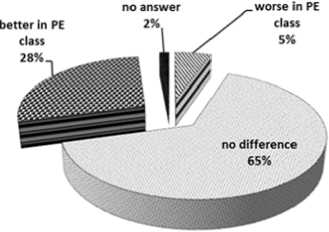
Sourse: Result of research of authors
n=202
The interviewed students collated also the overall discipline during the PES classes to that during lessons in the other school subjects (n=204). As per half of the respondents (51.2%), in general there is no difference in the behaviour of the classes during PES lessons and during lessons in the other subjects, while 37.1% of the students stated that the discipline in the PES classes is better than in the other classes (Fig. 3).
Ina Vladova, Nikolai Hristov
Discipline in / Sport and business, 3
Figure 3: Discipline of the class
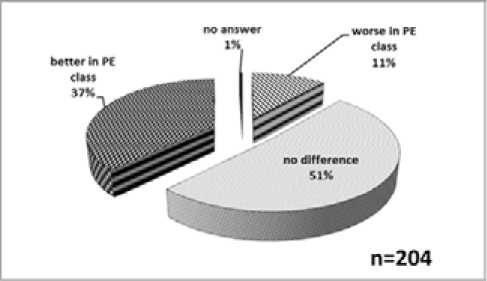
Sourse: Result of research of authors
We asked the students what could be the possible reason for non-observance of the rules for good behaviour and discipline during the classes in PES. They had the option to point more than one assertion and that’s why the summary of the answers in percentage is higher than 100. The results are given in Figure 4.
Figure 4: Possible reasons for non-observance of good dis-
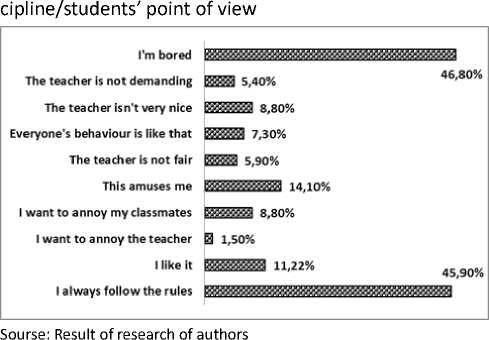
A small number of the respondents (15 students, i.e. 7.3%) have indicated that possible reason for non-observance of good discipline is that the behaviour of the rest of the students was same.
Such statement has been indicated almost three times more by the boys, while the greatest frequency was registered by the younger students
Ivan Ivanov [2] analysed the theory of discipline and self-discipline developed in the 80s – 90s of XX century by De Bruyn and Larson, where they suggested the motivators of the human behaviour that lay in the basis of any processes in the class. One of these priorities is the imitation – or namely ” the desire to be like the others and to do what the majority does “.
As we already have mentioned, parents play a significant role vis-a-vis the discipline of their children at school. Prents are ” the most important out-of-school assistants of the teacher “ [10]. From all respondents (n=202), only 5.9% stated that regarding the observance of the order and discipline during the classes in PES, their parents are not very exigent. The issue of observance of discipline in class has not been commented in more than half of the families (52.7%), while according to 40% of the students, their parents insist much on the discipline (Fig. 5). The results from the varational analysis show that the total support on behalf of the parents is М=2.35 (Min=1; Max=3; SD=0.59).
Ina Vladova, Nikolai Hristov the students. An important condition for ensuring a good discipline is to organise the learning lesson in a diverse, dynamic and interesting way, which proves once again the inter-relation between education and training.
5. ACKNOWLEDGEMENTS
We would like to express our gratitude to the principals of the schools for the permission to implement the research; to the teachers in Physical Education for their cooperation and to the students for their active participation.
Список литературы Discipline in the classes on physical education and sport
- Речник на чуждите думи в българския език.(1982). София: БАН.
- Иванов, И. (2004). Дисциплинарни модели. In:Образование и изкуство, том I, Шумен. Pp. 73-80.
- Десев, Л. (2003). Педагогическа психология.София.
- Пелтекова, И. (2015). Педагогическа комуникацияв обучението по физическо възпитание и спорт. In: Електронно научно списание Реторика и комуникация, бр. 17. Retrieved (20.06.2016). from:http://rhetoric.bg/
- Иванов, И. (2003). Мениджмънт на класа – еднанова (стара) тема. In: Юбилейна научна сесия: Общество на знанието и образованието за всички, София. Pp. 370-379.
- Иванов, И. (2010). Управление на поведението вкласната стая. In: Сборник материали от Първа пролетна национална конференция на тема: „Утвърждаване и повишаване авторитета на учителя в съвременните условия“, Варна. Pp. 23-34.
- Тодорина, Д. (2005). Култура на педагогическотообщуване. Благоевград.
- Николаева, С. (2010). Мениджмънт на класа (Каквознае, може и прави учителят като ефективен мениджър на ученическия клас). София.
- Кон, А. (2011). Митът за дисциплината. Отпослушание към сътрудничество. София: Изток-Запад.
- Айххорн, К. (2015). Философия на мениджмънта на класа (Част 1). Педагогика, 87, 2. Pp. 244-256.

